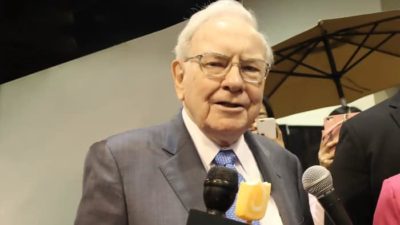This article was originally published on Fool.com. All figures quoted in US dollars unless otherwise stated.
Any big move that Warren Buffett makes could be a front-page headline, and the investing community was buzzing over the weekend with the news that Berkshire Hathaway Inc (NYSE: BRK.A)(NYSE: BRK.B) sold almost half its Apple stock in the second quarter. That came on the heels of other large sales in the portfolio.
Let's see what's happening, and why Buffett might be a seller right now.
Is Buffett done with Apple?
At a glance, you might think Buffett may have lost some love for Apple, but consider the larger context and you'll see a different story. Even after the sale, Apple remains the largest equity holding in the Berkshire Hathaway portfolio, by far.
Buffett made waves with a sale of Apple stock earlier this year, too, reducing his Apple stake from 49% of the portfolio to 44%. At recent prices, it's down to about 28%.
Although he's cut his stake, Buffett speaks highly of Apple. At Berkshire Hathaway's annual shareholder meeting in May, he said he expected it to stay a part of his portfolio and said it's an even better business than two other longtime favorites, American Express and Coca-Cola.
This stock sale seems less about concern with Apple and more about something else.
Buffett has been selling other stocks, too
Buffett also made waves over the past few weeks with news that he sold a chunk of Bank of America stock in increments as well. In July, he sold $2.3 billion of BofA stock over six days. Bank of America still remains the second-largest holding in the Berkshire Hathaway portfolio and accounts for 11.7% of the total. He still obviously feels good about the bank, since he's completely exited positions in other banks in recent years.
One stock he keeps buying, though, is Berkshire Hathaway. The company spent nearly $2.6 billion buying back shares in the first quarter, continuing a pattern of investing in itself.
Keeping up with interest rates
Armchair analysts don't know for sure why Buffett has been selling stocks, or these stocks specifically. He hasn't said anything publicly. But he's said some things recently that can give investors clues. At Berkshire Hathaway's annual meeting, he said:
Unless something dramatically happens that really changes our capital allocation strategy, we will have Apple as our largest investment, but I don't mind at all, under current conditions, building the cash position. I think when I look at the alternative of what's available, the equity markets, and I look at the composition of what's going on in the world, we find it quite attractive.
Berkshire Hathaway can make an attractive return on the huge stockpile of cash that it holds via short-term Treasury bonds without exposing itself to risk. Mix that with a volatile stock market, and it makes a lot of sense to hold on to cash right now.
But there's another reason.
Ready to pounce?
Buffett looks for undervalued stocks that the market might miss (in addition to other features). But he's patient, and if there isn't anything that fits his investing criteria, he doesn't buy. At the annual meeting, he said: "There have been times in my life that I've been awash in so many opportunities that I could have invested everything by nightfall." But not lately: "We haven't seen anything that makes sense that moves the needle."
Does this point to a larger warning for the markets? Not necessarily. Holding on to cash is a good enough reason to hold out and wait for attractive opportunities. Even without high interest rates, Buffett has implied that he won't buy stocks if the value proposition isn't strong enough.
Could it be a warning for the markets? It could, because it signals that stocks are overpriced right now. Markets are bound for corrections if valuations become too high. It's a cycle that plays out over and over again. So while it could be a signal of a coming correction, or even something worse than a correction, it's not a signal to panic sell or even worry.
As always, investors can glean knowledge from Buffett's wisdom and investing approach. But you should remember that Buffett runs a publicly traded holding company, and that means his strategy will differ from that of the average investor. You can buy Berkshire Hathaway stock to benefit from his direct management, but for your personal portfolio, follow his general advice rather than his specific moves.
This article was originally published on Fool.com. All figures quoted in US dollars unless otherwise stated.









